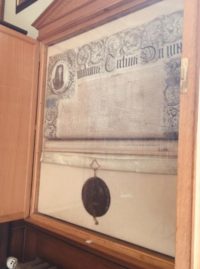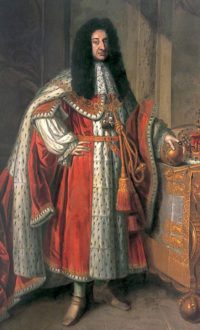Charter of Incorporation

The Charter in it’s case in Deal Town Hall
We perhaps have two men to thank for our knowledge of how Deal gained it’s Charter of Incorporation. Firstly one of the men who was actually there, the Slopseller Thomas Powell, who recorded in his own words the “…particulars and proceedings…” that led to Deal gaining it’s Charter and Stephen Pritchard who much later, in 1864, printed those words “…as narrated by Thomas Powell… ” in his book, the History of Deal.
A merchant who sold cheap ready-made clothing or rough working dress. These were known as slops. These would include butchers’ aprons or articles of clothing and bedding issued or sold to sailors.
Saturday 13 December 1698
On Saturday 13 December 1698 a parish meeting was held. Pritchard’s quote says “The Parish met at St. Leonard’s Church in Vestry pursuant to a notice given the previous Sunday”
A Vestry is a room or building attached to a church used as an office and for changing into ceremonial vestments. A Vestry meeting was a meeting of parishioners, originally in a vestry, for the conduct of parochial business.
A vote was then taken to elect twenty men. Known as the ‘Managers’ they formed the committee that was then to plan and go about the business of gaining the Charter.
They were:
- Captain Joshua Coppin
- Valentine Bowles
- Thomas Stone
- Captain Dudley St. Leger
- Daniel Martin
- Captain Thomas Gardner
- Henry Bowles
- William Conning
- Thomas Brothers
- Samuel Harris
- Abraham Hudson
- Joseph Lane
- Benjamin Hulke
- Samuel Fasham
- Thomas Horne
- Thomas Powell
- Josiah Dehane
- Joseph Nicholls
- Ayl Blishendine
- Stephen Wythorden
The meeting, we are told, was then closed but later that same night the Committee of Managers met at Foster’s Coffee House in Deal to decide on how they should proceed and rules were then drawn up. Where this Coffee House was is currently not known but it was used by the managers to hold their planning meetings.
It stated at this meeting that the parishioners had already subscribed £500 for the purpose of gaining the town it’s Charter. This was a vast sum of money and approximately £53,491.65 today.
Rules were decided upon and, in brief, they were:
- Whatever was discussed was to be done behind closed doors so Sandwich “…should not adopt means to thwart our projects”
- A book was to be obtained to minute all meetings and the rules entered into it.
- Treasurers were to be chosen who will not pay out any money without an order signed by seven of the managers.
- That in the event of any trouble gained by a Manager, in furthering the aim of gaining the charter, then all the other Managers will stand by him. That if one of these men should die that another shall be elected provided that they pay £5 into the fund.
- Collectors (presumably anyone who has collected money for the cause) at each meeting should produce their receipts and give them to the Treasurers.
- That three managers be elected to go to London to negotiate and take whatever measures needed to further their objective and to correspond with their colleagues in Deal.
These rules were then signed by the twenty Managers. Henry Bowles, Captain Thomas Gardner and Thomas Powell were chosen as the men who should go to London to negotiate and carry out any measures that would enable the furtherment of their cause. Valentine Bowles and Samuel Fasham were to become Treasurers, Samuel Harris was to write to Mr. Gorrard, Secretary of the Sick and Wounded Society that, during this time, were part of the Navy Victualling Board, in London to ask for his assistance and giving him the reasons for wanting to become an Incorporated Market Town telling him that his services would be rewarded.
Also known as the Sick and Hurt Board, though fully titled The Commissioners for taking Care of Sick and Wounded Seamen and for the Care and Treatment of Prisoners of War. They were responsible for medical services in the Royal Navy and were a subsidiary body to the Navy Board, supplying surgeons to naval ships, providing them with medicines and equipment, and running shore and ship hospitals; they were also responsible for prisoners of war.
Friday 19 December 1698
It was decided that each of the Managers should put in writing the reasons that he considered caused hardship to the parishioners of Deal because of the dependency upon Sandwich.
Tuesday 23 December 1698
This meeting started with the order that only one person was to speak at once. Then it was decided that, by the next Monday, a subscription list was to be made by John Dane, Joseph Nicholls and Thomas Powell. Joseph Lane was then nominated as Secretary. Also by the next Monday, it was decided that Thomas Powell, using the twenty managers considerations for separating from Sandwich, was to have prepared the conclusive reasons why Deal “ought to be no longer dependent on Sandwich”
Monday 29 December 1698
It was on Monday 29 December 1698, that it was agreed to publish their
“reasons grounded on facts why we would no longer be subject to Sandwich”
- That we may be enabled to put into execution the laws of the kingdom against all sorts of crimes and offences, which at present we cannot to any purpose by reason of our Court of Justice being at Sandwich, a distance of five miles from us, to which place we must go whenever any Justice if the Peace is required, in signing the Poor Cess or the removal of any pauper, or the apprehending of any offender against the laws when any warrant is needed; and sometimes from caprice these things have been denied us.
- That if Deal had a Corporation of its own, it would erect someplace and raise means to set the idle poor to work, which are very numerous and daily increasing to an influx of strangers coming to settle among us, which occasions trouble and expense in removal, that bears very heavily on the rates. These strangers come from all parts, and being poor when they come, soon fall chargeable to the parish.
- That Sandwich puts on us fines for licences of public houses and does whatever it pleases, and keeps that money and returns none to us, which would assist our rates if we were separated from that place.
- That although we are a limb of Sandwich they refuse us the privilege of freemen and we have no votes in choosing Parliament men. We are more numerous than they, entertain more strangers, have more business requiring Justice and pay more yearly to the King’s taxes than Sandwich……….
- That if we obtained a Charter of Incorporation we should be able to suppress many disorders, riots among sailors and escapes for debt, also murders and misdemeanours which we have no power now to do. The delay in obtaining legal powers causes offenders to escape: and it is a source of complaint that we have no Justice of Peace nearer than Sandwich.
- That we have every reason to believe that the Admirals, Commanders and Officers of His Majesty’s Navy, as also all shipowners and merchants and all master mariners who so frequently are in the Downs are willing to assist us in what we are seeking to obtain, because they are as much inconvenienced as ourselves in the matter of obtaining justice when needed – it being so far away from the Downs.
- That we are encouraged to believe that as Folkestone, Fordwich and Faversham etc. have been incorporated, although limbs of port and in all respects inferior to us in population, trade, commerce, and our reasons exceeding theirs, the same privilege will be granted to us. We have many individuals living among us, intelligent and judicious persons, every way qualified to fill the offices should His Majesty be pleased to accede to our request in granting us a Charter of Incorporation.
- That since the ancient laws of this kingdom have put in execution, viz. that all corn and provisions should be brought to Market Towns and sold there and nowhere else, it hath proved a great injury to the inhabitants of Deal, which since these laws were made, has become a place of considerable trade and is increasing daily in population. Deal pays more ing’s taxes and provides more subjects to serve him than Sandwich our next nearest market town, to which place we are bound to go to buy whatever we want- a place of five miles from us
- The situation of Deal is opposite The Downs the great road of England where sometimes may be seen three or four hundred ships of all sizes at anchor, which have been supplied with fresh provisions and necessaries from us; but now corn, flour, etc, must be bought in a market, which before we purchased by sample. Unless we are made a Corporate and Market town we shall not be able to supply, as heretofore, the wants of the shipping which are sometimes very great. This will be a great detriment to the public trade of the country, to our East India merchants’ ships and other trading vessels which sometimes lie in the Downs a month or more for a fair wind. They must live upon the sea stock; so when at sea making a long passage they will be short of provisions.
- The oppression of the poor is very great: with scanty means they are constrained to buy bread and provisions at extreme rates because they cannot spare time from their daily labour to go five miles to but a bushel, half- bushel or a peck of corn or offal to feed their pigs and cows with, although paid ready money for what they want.
- That our being dependent on Sandwich for every article of food places the people in a very great strait, incapacitates the ships’ agents and boatmen in sending daily supplies to the shipping and enhances the price, causing general complaints among the whole population now exceeding three thousand souls a much larger number than Sandwich, which monopolises all law and justice, as well as doling out to us supplies of provisions at high prices, which is both troublesome and inconvenient and a vast oppression on the poor.

William 111
Tuesday 13 October 1699
As we now know all the efforts of the twenty Managers, were successfully rewarded and on the 13 October 1699 His Majesty King William 111 granted Deal its Charter of Incorporation and fixed the Great Seal of State to it.
In doing so it gave the town the freedom and powers to buy and sell land, tenements goods and chattels to annually on the 1st of August elect a Mayor and other offices, to enrol freemen, to provide a gaol or prison, to hold a market on every Tuesday and Saturday and a cattle and goods fair, held over two days, twice a year, to hold Pie-powder Courts and to make laws, bye-laws with penalties as and when necessary
Joshua Coppin was named in the Charter as the towns first Mayor and it is recorded that he was insistent, and quite rightly so, that his name was to be spelt correctly as Coppin and not Coppen.
Cess (parish cess)– A tax for the Relief of the Poor



